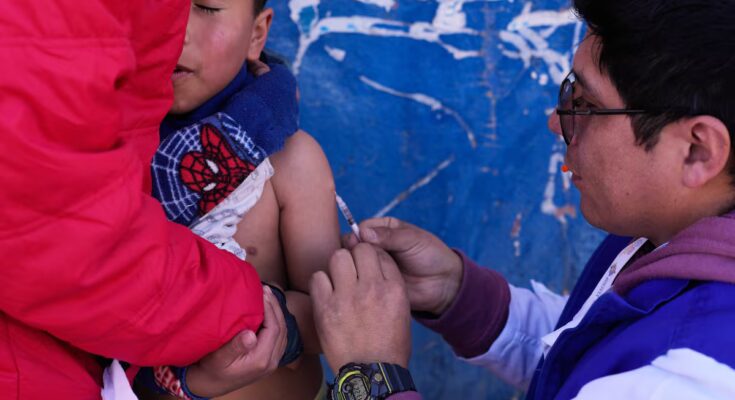The American region, the only one in the world to achieve measles-free zone status, lost this coveted certification after Canada failed to halt sustained transmission of the disease before reaching 12 months of circulation. The rest of the countries maintain it, despite the continent’s decline, but several states have strong outbreaks, such as Mexico and the United States, which share an outbreak on both sides of the border located in a religious community opposed to vaccination. Low immunization rates are the main cause of the emergence and spread of these epidemics. To achieve population immunity, coverage greater than 95% is needed in the two recommended doses, but the region is currently at 79% and Mexico at 69%.
“This represents a setback, but it is a reversible situation,” said Jarbas Barbosa, director of the Pan American Health Organization (PAHO), the WHO affiliate on the continent, on Monday morning after presenting the findings of the expert commission that met last week in Mexico City to analyze the state of the disease. The Americas have twice achieved measles-free status, most recently in 2024, but are the only region to do so. “This continues to be one of the greatest public health achievements we have achieved,” Barbosa said with moderate optimism, warning that as long as the disease continues to be transmitted to the rest of the continents, where transmission is most intense, America will continue to be vulnerable to the importation of cases from abroad, the source of the current epidemics.
Mexico still retains its individual certificate, but the risk of losing it is not over. The North American country is facing a national epidemic that has accumulated eight months of transmission since the first epidemiological alarm was raised in March. Since then there have been 23 deaths, 21 of which in Chihuahua, on the northern border, and cases have spread to 27 of the 32 states of the Republic: there are 5,185 confirmed patients, and more than double the number of possible unconfirmed infections. The other two deaths occur in Sonora and Durango, the last entity to report a death, about a month ago.
PAHO acknowledged the country’s efforts to contain the epidemic, but warns that Mexico cannot wait for the follow-up campaign scheduled for April 2026 to strengthen vaccination, which still does not reach the necessary standards. Measles is the most contagious disease in the world. Each case can generate up to 18 more cases, so vaccination coverage must be above 95%.
Chihuahua and Oaxaca were the first states in Mexico to report patients. The southern entity, with a very small epidemic, managed to control it almost immediately, but the northern region continues to struggle to contain an epidemic that quickly spiraled out of control: partly due to the size of the epidemic, much larger than that of Oaxaca; partly due to the reluctance of some Mennonite communities toward immunization; and partly due to the very orography of the territory, which disperses the population and makes access for professionals difficult, especially in the mountains.
Infections in this area are spreading among day laborers who travel from the mountains to the Mennonite camps, where they are exposed to the disease. Due to the seasonality of some jobs, the population moves from one area to another, bringing measles to states that previously had no cases of measles. To protect this segment of the population, considered at risk of potential infection, in July the Government extended the vaccination age to 49 for those under 40, a population usually recommended.
PAHO officials explained this Monday that Mexico must focus on transferring vaccines to the United States and covering these seasonal workers, as well as strengthening communication between regions. This week a support mission from the international organization will travel to Chihuahua to help train professionals, monitor laboratories and access vaccines, one of the most important challenges. It is essential, Jarbas Barbosa explained, that families can find doses in their health centers at any time, even on weekends, since informality can become a barrier to accessing vaccinations if these are very limited.
It is equally important, he added, that medical personnel know how to translate the importance of getting vaccinated into simple language. Many of the outbreaks occur in communities that continue to show strong reluctance towards this method of protection, about which doubts have been sown in recent years with speeches that contradict scientific evidence. Compression at this point is essential. According to PAHO itself, measles immunization helped prevent 60 million deaths worldwide between 2000 and 2023, including 6 million in America.



